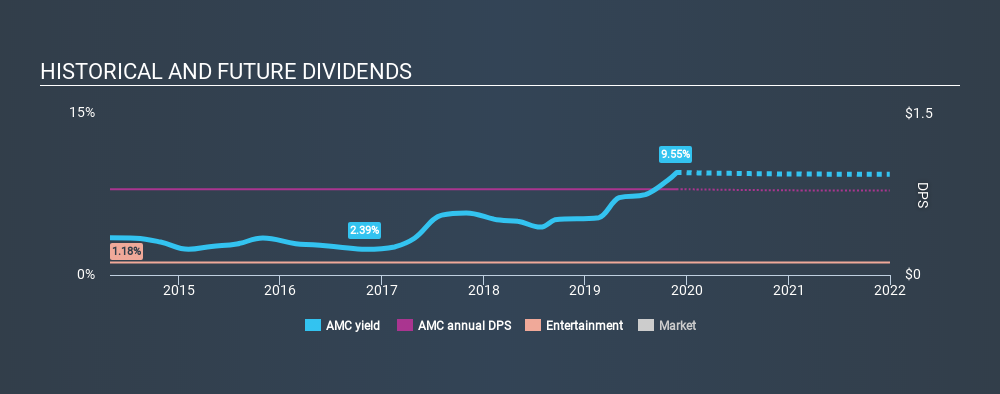
Dividend paying stocks like AMC Entertainment Holdings, Inc. (NYSE:AMC) tend to be popular with investors, and for good reason - some research suggests a significant amount of all stock market returns come from reinvested dividends. On the other hand, investors have been known to buy a stock because of its yield, and then lose money if the company's dividend doesn't live up to expectations.
So you may wish to consider our analysis of AMC Entertainment Holdings's financial health, here.
With a goodly-sized dividend yield despite a relatively short payment history, investors might be wondering if AMC Entertainment Holdings is a new dividend aristocrat in the making. It sure looks interesting on these metrics - but there's always more to the story . There are a few simple ways to reduce the risks of buying AMC Entertainment Holdings for its dividend, and we'll go through these below.
Explore this interactive chart for our latest analysis on AMC Entertainment Holdings!

Payout ratios
Dividends are typically paid from company earnings. If a company pays more in dividends than it earned, then the dividend might become unsustainable - hardly an ideal situation. Comparing dividend payments to a company's net profit after tax is a simple way of reality-checking whether a dividend is sustainable. In the last year, AMC Entertainment Holdings paid out 237% of its profit as dividends. Unless there are extenuating circumstances, from the perspective of an investor who hopes to own the company for many years, a payout ratio of above 100% is definitely a concern.
In addition to comparing dividends against profits, we should inspect whether the company generated enough cash to pay its dividend. Unfortunately, while AMC Entertainment Holdings pays a dividend, it also reported negative free cash flow last year. While there may be a good reason for this, it's not ideal from a dividend perspective.
Is AMC Entertainment Holdings's Balance Sheet Risky?
As AMC Entertainment Holdings's dividend was not well covered by earnings, we need to check its balance sheet for signs of financial distress. A quick check of its financial situation can be done with two ratios: net debt divided by EBITDA (earnings before interest, tax, depreciation and amortisation), and net interest cover. Net debt to EBITDA measures total debt load relative to company earnings (lower = less debt), while net interest cover measures the ability to pay interest on the debt (higher = greater ability to pay interest costs). AMC Entertainment Holdings has net debt of 6.50 times its EBITDA, which implies meaningful risk if interest rates rise of earnings decline.
Net interest cover can be calculated by dividing earnings before interest and tax (EBIT) by the company's net interest expense. With EBIT of less than 1 times its interest expense, AMC Entertainment Holdings's financial situation is potentially quite concerning. Readers should investigate whether it might be at risk of breaching the minimum requirements on its loans. High debt and weak interest cover are not a great combo, and we would be cautious of relying on this company's dividend while these metrics persist.
Dividend Volatility
From the perspective of an income investor who wants to earn dividends for many years, there is not much point buying a stock if its dividend is regularly cut or is not reliable. AMC Entertainment Holdings has been paying a dividend for the past six years. Its dividend has not fluctuated much that time, which we like, but we're conscious that the company might not yet have a track record of maintaining dividends in all economic conditions. Its most recent annual dividend was US$0.80 per share, effectively flat on its first payment six years ago.
We like that the dividend hasn't been shrinking. However we're conscious that the company hasn't got an overly long track record of dividend payments yet, which makes us wary of relying on its dividend income.
Dividend Growth Potential
Dividend payments have been consistent over the past few years, but we should always check if earnings per share (EPS) are growing, as this will help maintain the purchasing power of the dividend. AMC Entertainment Holdings's EPS have fallen by approximately 41% per year during the past five years. A sharp decline in earnings per share is not great from from a dividend perspective, as even conservative payout ratios can come under pressure if earnings fall far enough.
Conclusion
When we look at a dividend stock, we need to form a judgement on whether the dividend will grow, if the company is able to maintain it in a wide range of economic circumstances, and if the dividend payout is sustainable. We're a bit uncomfortable with AMC Entertainment Holdings paying out a high percentage of both its cashflow and earnings. Second, earnings per share have been in decline, and the dividend history is shorter than we'd like. In this analysis, AMC Entertainment Holdings doesn't shape up too well as a dividend stock. We'd find it hard to look past the flaws, and would not be inclined to think of it as a reliable dividend-payer.
Given that earnings are not growing, the dividend does not look nearly so attractive. See if the 12 analysts are forecasting a turnaround in our free collection of analyst estimates here.
We have also put together a list of global stocks with a market capitalisation above $1bn and yielding more 3%.
If you spot an error that warrants correction, please contact the editor at editorial-team@simplywallst.com. This article by Simply Wall St is general in nature. It does not constitute a recommendation to buy or sell any stock, and does not take account of your objectives, or your financial situation. Simply Wall St has no position in the stocks mentioned.
We aim to bring you long-term focused research analysis driven by fundamental data. Note that our analysis may not factor in the latest price-sensitive company announcements or qualitative material. Thank you for reading.
About NYSE:AMC
AMC Entertainment Holdings
Through its subsidiaries, engages in the theatrical exhibition business in the United States and Europe.
Good value slight.
Similar Companies
Market Insights
Community Narratives



